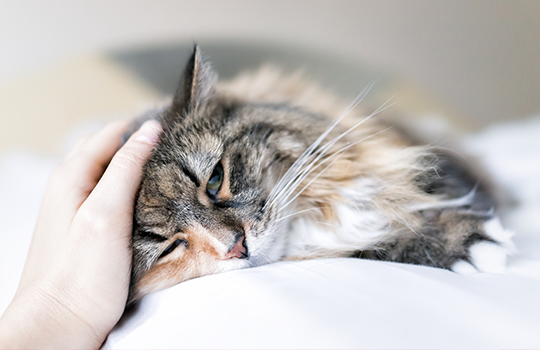As our furry (or scaly) friends start getting on in years, they need a little extra TLC to keep them feeling their best.
Whether you've got a loyal dog, a graceful cat, a tiny pal like a hamster or a quirky reptile, here's a breakdown of how to give each type of ageing pet the care they deserve.
Dogs
Diet and Nutrition
• It’s really important to switch up their food to a senior-specific diet packed with all the good stuff they need for their joints and heart.
• Be aware of their slowing digestion, any issues they may have with processing food, chewing and swallowing etc. and adjust the portion sizes, feeding schedule and types of food accordingly.
• Keep an eye on their bathroom breaks—they might need to go more often. If there are any changes, like accidents indoors, it's worth having a chat with your vet.
• Place water and food bowls on slightly raised surfaces to help your pooch reach the contents more easily.
Supplements
• Have a chat with your vet about what extra goodies your hound might benefit from.
• Think about adding supplements like glucosamine and omega-3 fatty acids to keep them spry.
Sleeping and Housing
• Make sure their bed is as comfy as your favourite spot on the couch, especially with a bit of extra cushioning for those achy joints.
• Keep their sleeping spot cosy, quiet, and draught-free, whether that’s indoors or outside.
• Be aware that their skin might be more sensitive and well-ventilated beds, especially during hotter periods, can help keep skin cool and dry.
• Remove any obstacles that might prevent them moving from resting place to outdoors, or around the house.
• Smooth floors can be tricky for seniors to navigate, so lay down a rug or carpet to give them better traction.
• Simplify their life by keeping everything within easy reach—water, food, toys, and a snug bed should all be conveniently located.
Exercise
• It's all about low-key activities like short walks and gentle playtime to keep them feeling good.
• Keep an eye on their energy levels and adjust the fun accordingly.
• Aqua therapy or simple water-based activities can be fun for older dogs as the weightlessness of water helps alleviate any joint pains.
Medical Care
• Regular check-ups are a must to catch any age-related issues early on.
• Don't forget to keep up with vaccinations and tick treatments.
• Ensure mouth hygiene is kept to the highest standards to help hound eat comfortably.
Cats
Diet and Nutrition
• For cats, a senior-specific diet is essential as they get holder to ease their kidneys and bladder.
• Wet food can help keep them hydrated and also keep things moving in the litter box.
• If your cat has dental issues, opt for softer food in jelly or gravy instead of hard pellets. Adding a splash of water and mashing it up can also help.
• Make mealtimes enjoyable – stimulate your cat's mind with puzzle feeding, keeping them mentally engaged and feeling young!
• Place water and food bowls on slightly raised surfaces to help your cat reach the contents more easily.
Supplements
• Consider giving them a little probiotic boost for their tummy.
• Omega-3s are great for their skin and fur.
Sleeping and Housing
• Soft beds in quiet spots are ‘purr-fect ‘for your senior kitty.
• Give them some vertical space to climb and stretch those old bones.
• Ensure their environment is conducive to easier movement than when they were younger and able to reach pretty much anywhere!
Exercise
• Keep them entertained with toys that get them moving and thinking.
• Watch their weight and adjust food as needed to make movements as easy as possible.
Medical Care
•Keep those pearly whites clean with regular dental check-ups.
•Keep an eye out for things like thyroid problems and achy joints.
Small Pets (Hamsters, Gerbils, Rabbits, Birds)
Diet and Nutrition
• Mix up their diet with fresh veggies, fruits, and pellets made just for them and don't forget the H2O!
Supplements
• If they need a little extra boost, chat with a specialist about what's best.
• But don't overdo it – too much of a good thing can cause issues with digestion, stomachs, skin and more..
Sleeping and Housing
• Make sure their pad is clean, comfy and roomy, with plenty of places to hide and get some peace.
• Keep the temperature and humidity just right for them, with enough fresh air but not in a draughty area.
Exercise
• Toys, tunnels, and climbing things are great for keeping them moving and grooving.
• Let them roam outside their cage (supervised, of course) for some mental stimulation, but keep obstacles to those that they don’t struggle with.
Medical Care
• Keep an eye on their appetite, activity levels, and breathing – any changes could mean trouble.
• If they're feeling under the weather, get them to a vet who knows their stuff about little critters.
Reptiles
Diet and Nutrition
• For senior snakes, smaller meals more often seem to do the trick. And for turtles and tortoises, chop up their food into bite-sized bits.
• Oh, and don't forget about the calcium and vitamin D3 – they need a bit more of that as they get older.
• Offer a diet that matches their species' requirements, which may include live insects, leafy greens, and occasional fruit.
• Ensure they receive proper calcium and vitamin supplementation to prevent metabolic bone disease.
Housing
• Provide a spacious and well-ventilated enclosure with appropriate heating and lighting to mimic their natural habitat.
• Keep the humidity levels up too. Misting their terrarium or giving them a good soak should do the trick.
• And make good use of UVB lighting and give them basking areas to allow for thermoregulation.
Handling and Interaction
• Limit handling to minimise stress, as reptiles are sensitive to changes in their environment.
• Provide opportunities for mental stimulation through environmental enrichment, such as climbing structures and foraging activities.
Medical Care
• Regularly monitor for signs of illness, including changes in appetite, skin condition, and behaviour.
• Skin colour is a particularly good indicator – any unusual changes there may mean your pet needs attention and inspection by a vet.
Giving your ageing pet the love and care they need is all about knowing what makes them wag their tail (or wiggle their scales). So, keep those vet appointments regular, make sure they're eating right, and give them plenty of cuddles – because they're family, after all!




